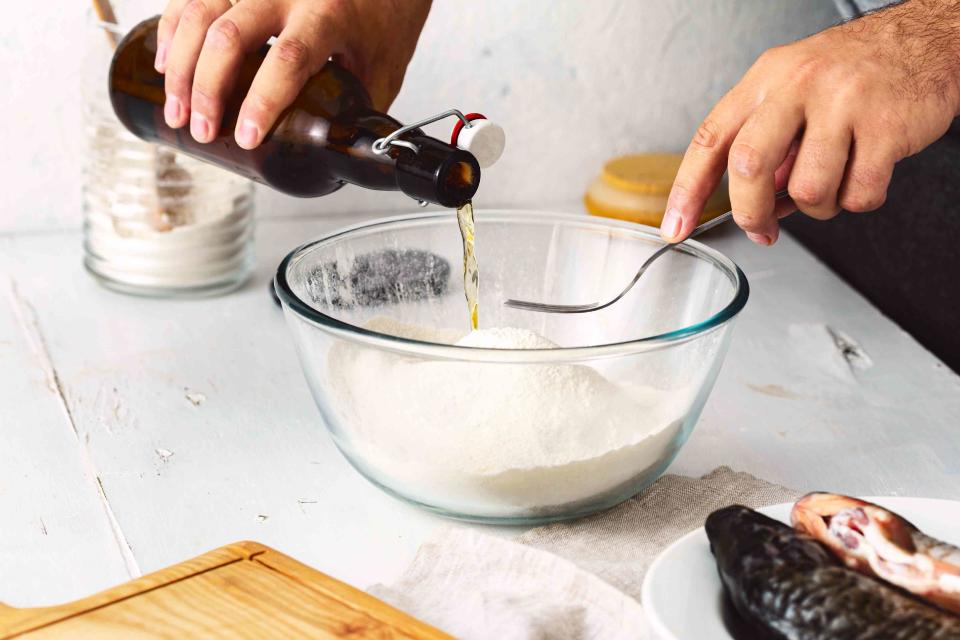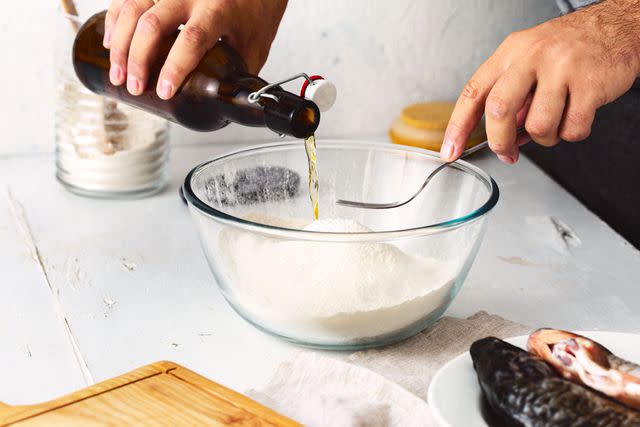How to Use Leftover Beer in the Kitchen
Here’s how to use up that dented beer can that’s been hanging out in the fridge since your last party.

Kucher AV / Getty Images
Every time I throw a party, especially in the summer, I’m left with a lot of beer that I don’t want. Even if I haven’t had people over recently, there’s often a stray can of PBR lingering in the back of my fridge, waiting to be opened on a day that may never come. When I do pop open a beer, I don’t necessarily always want to finish it; maybe it’s a weeknight and I can’t commit to a whole drink. Maybe it’s my third beer and I decide I don’t want to finish the bottle. Whatever the case, there are inevitably days when I find myself sadly pouring the latter half of a brewski down the drain. While some of you might be aghast, I’m confident that even the most avid of beer drinkers leaves something leftover occasionally. If you ever find yourself with half of a leftover lager, some old cans in your fridge that no one seems to ever want, or you’d just like to try cooking with beer more often, there are a lot of ways you can use beer in the kitchen. Here’s why it’s worth popping open a can or bottle for your next homemade meal.

Kucher AV / Getty Images
Beer can infuse food with hoppy, malty, and acidic flavors
We often think of wine or liquor when whipping up a flavorful sauce (hello pasta alla vodka), but beer also works well for certain sauces. Making a pan sauce for sautéed chicken or pork? Substitute beer for the wine; it will deglaze the pan like wine, and add similar but slightly more muted acidic notes. You can tailor the beer you use to the flavor you want in your sauce — try a lager for a lighter pan sauce along the lines of one made with white wine, or use a stout for something more bitter and robust. I’ve even replaced the white wine called for in a risotto with beer, and the finished dish had a slightly more nutty, earthy flavor. And of course I’d be remiss to talk about taking advantage of the flavor of beer without mentioning the classic combination of Beer and Cheddar Cheese Soup. If you’re craving something cozy during the colder months, whip up some hearty beef stew with beer instead of stock; it’s a classic move in Belgian cooking.
Use beer as a cooking liquid for braising, steaming, and more
The next time you’re making a marinade, try adding some beer! Similar to other liquids used to marinate, soaking in beer will help ensure your food stays moist as it cooks — and it contains enzymes that can help tenderize meat. Or you can use beer to actually cook your ingredients. Seafood pairs well with the crisp, light flavors of a lager, so try steaming shrimp, clams, or mussels in beer, like Tyler Florence. Beer also works well as a braising liquid; it’ll add aromatic notes to whatever you’re cooking, and the acidity will make the meat fall-apart tender. The German and Alsatian versions of the classic dish coq au vin actually often call for malty brown ale instead of wine. If a braising recipe calls for white wine and you don’t have any on hand, you can easily make it with the last two cans from a six-pack of Miller Light instead.
Beer can create light, airy fried foods and baked goods
The bubbles in beer make it a great ingredient to use in batters. The carbonation will evaporate as the food fries, leaving you with an ethereally light coating on whatever you’re cooking, similar to tempura. You’ve probably heard of beer-battered fish, but imagine dishes like fluffy Blue Crab Beignets and Fried Cheese Curds coated with beer batter, too. Don’t want to deep-fry? Harness the bubbles of beer by adding it to a loaf of quick bread, where it’ll help keep the crumb light and airy.
Freeze leftover beer for future cooking
If you find yourself with an open beer can that you can’t finish, but you’re not ready to cook with it that day, simply freeze it. Beer that’s been frozen isn’t great for drinking, but it will work just fine for cooking. While you can’t freeze whole cans of beer (spoiler: they’ll explode), you can pour it into an ice cube tray without a lid, which will give it room to expand slightly. Beer will lose its carbonation as it freezes, so I wouldn’t recommend using frozen beer in a batter, but you can certainly toss a few frozen cubes into a skillet to make a pan sauce. With a freezer full of beer cubes and an arsenal of recipes at the ready, you’ll be prepared to leverage the flavor and fizz of this classic beverage at any time.
For more Food & Wine news, make sure to sign up for our newsletter!
Read the original article on Food & Wine.

